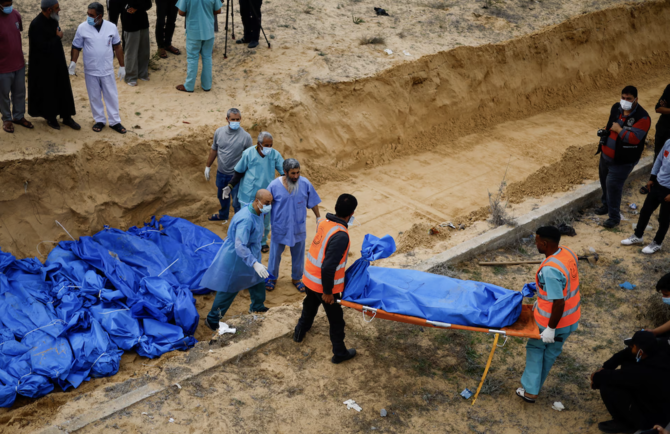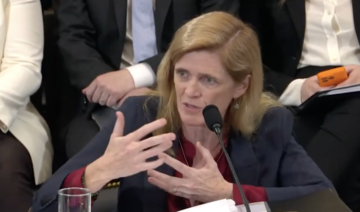NEW YORK CITY: UN Secretary-General Antonio Guterres on Tuesday said he was deeply alarmed by reports that mass graves had been discovered in several places in Gaza.
He called for independent international forensics experts to be granted immediate access to the sites to establish the circumstances in which hundreds of Palestinians lost their lives and were “buried or reburied” there.
The mass graves were discovered this month in several parts of war-ravaged Gaza, including at Al-Shifa and Al-Nasser hospitals, both of which were attacked by the Israeli army. Graves were also found in Beit Lahia and Deir Al-Balah. Many women and children were among the dead.
At Al-Nasser alone, more than 390 bodies were discovered. Many showed apparent signs of being shot in the head, had their hands bound by zip ties, were stripped of their clothes, or were buried in hospital gowns with medical needles and tubing still attached to their skin.
The healthcare system in Gaza has been brought to its knees by the war; two-thirds of hospitals are dysfunctional and those that remain operational are seriously damaged. Guterres said some healthcare facilities “now resemble cemeteries.”
He added: “There are competing narratives around several of these mass graves, including serious allegations that some of those buried were unlawfully killed.
“It is imperative that independent international investigators, with forensic expertise, are allowed immediate access to the sites of these mass graves to establish the precise circumstances under which hundreds of Palestinians lost their lives and were buried, or reburied.
“The families of the dead and missing have a right to know what happened. And the world has a right to accountability for any violations of international law that may have taken place.”
Speaking at the UN headquarters in New York, Guterres once again expressed solidarity with the victims of the “unconscionable Hamas terror attacks of Oct. 7,” and with the hostages and their families and friends.
“Passover reminds us that the persecution of the Jews is as old as history itself,” he said. “We all have a duty to speak out against all forms of antisemitism, in communities, in the media and online.”
Nearly seven months after Oct. 7, the situation facing the people of Gaza “is worsening by the day,” Guterres said as he lamented the fact his incessant calls for a humanitarian ceasefire, the release of all hostages, and a significant increase in the amount of humanitarian aid flowing into the territory have been ignored.
“For the sake of the people of Gaza, for the sake of the hostages and their families in Israel, and for the sake of the region and the wider world, I strongly encourage the government of Israel and the Hamas leadership to reach an agreement,” he said.
“Without that, I fear the war, with all its consequences both in Gaza and across the region, will worsen, exponentially.”
He said a threatened Israeli military ground assault on the southern city of Rafah, where more than 1.2 million displaced Palestinians have taken refuge from bombardments elsewhere in the territory, would be “an unbearable escalation, killing thousands more civilians and forcing hundreds of thousands to flee.”
He urged “those with influence over Israel to do everything in their power” to prevent such an incursion, noting that all members of the Security Council, and many governments, have expressed opposition to it.
Palestinians sheltering in Rafah “have very little to eat, hardly any access to medical care, little shelter and nowhere safe to go,” Guterres said.
“In northern Gaza, the most vulnerable — from sick children to people with disabilities — are already dying of hunger and disease. We must do everything possible to avert an entirely preventable, human-made famine.”
Although some progress had been made in humanitarian efforts, Guterres said “much more is urgently needed, including the promised opening of two crossing points between Israel and northern Gaza, so that aid can be brought into Gaza from Ashdod port and Jordan.”
A major obstacle to the delivery of aid across the territory remains the lack of guarantees of security for aid workers and the civilians they are trying to help.
“Humanitarian convoys, facilities and personnel, and people in need, must not be targets,” said Guterres.
“We welcome aid delivery by air and sea, but there is no alternative to land routes. I again call on the Israeli authorities to allow and facilitate safe, rapid and unimpeded access for humanitarian aid and humanitarian workers, including UNRWA (the UN Relief and Works Agency for Palestine Refugees), throughout Gaza.


























